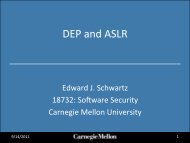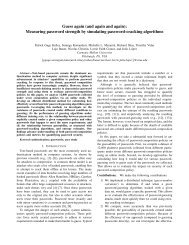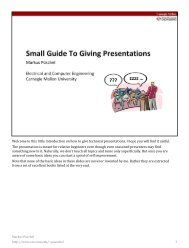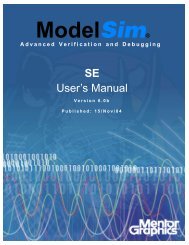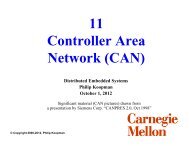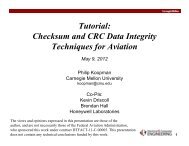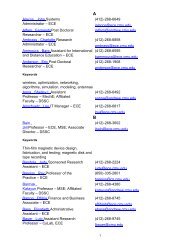Hamerschlag Hall Walking Tour Guide - Electrical and Computer ...
Hamerschlag Hall Walking Tour Guide - Electrical and Computer ...
Hamerschlag Hall Walking Tour Guide - Electrical and Computer ...
You also want an ePaper? Increase the reach of your titles
YUMPU automatically turns print PDFs into web optimized ePapers that Google loves.
U N D E R G R A D U A<br />
L<br />
A B O R A T O R I E S<br />
HH 1107 - ECE Undergraduate <strong>Computer</strong> Cluster<br />
Students entering their sophomore year in ECE receive an account allowing access to cluster<br />
machines. Except when reserved for a class, this cluster is available to all ECE undergraduates.<br />
Students can log on to state-of-the-art machines in the cluster at the terminal or remotely.<br />
The computers are used for courses such as “Introduction to <strong>Computer</strong> Architecture,”<br />
“Analysis <strong>and</strong> Design of Digital Circuits,” <strong>and</strong> capstone design courses in analog <strong>and</strong> digital<br />
integrated circuits. Since these machines contain various industry-st<strong>and</strong>ard software packages,<br />
students do not have to purchase the software for some courses. Cluster computers<br />
also provide email, word processing, <strong>and</strong> presentation software for the preparation of lab<br />
reports <strong>and</strong> project presentations.<br />
HH 1303 - Fundamentals of <strong>Computer</strong> Engineering Lab<br />
In this required sophomore level course, 18-240, students work in pairs on four or five labs,<br />
each lasting from one to three weeks. The course introduces basic issues in design <strong>and</strong> verification<br />
of modern digital systems. Topics include Boolean algebra, digital number systems <strong>and</strong><br />
computer arithmetic, combinational logic design <strong>and</strong> simplification, sequential logic design<br />
<strong>and</strong> optimization, register-transfer design of digital systems, basic processor organization<br />
<strong>and</strong> instruction set issues, assembly language programming <strong>and</strong> debugging, <strong>and</strong> a hardware<br />
description language. Students use computer-aided digital design software <strong>and</strong> actual hardware<br />
implementation laboratories to learn about real digital systems. They also write Verilog<br />
descriptions of circuits. Verilog is a hardware description language used to model logic hardware<br />
designs. Each student tests his or her description on a software simulator <strong>and</strong> finally<br />
downloads the description to the Altera field-programmable gate array (FPGA) board, transforming<br />
the device into a working hardware system.<br />
HH 1305 - Fundamentals of <strong>Electrical</strong> Engineering Lab<br />
T E<br />
This required sophomore-level course, 18-220, covers fundamental topics that are common<br />
to a wide variety of electrical engineering devices <strong>and</strong> systems. Topics include circuit analysis<br />
techniques, passive <strong>and</strong> active component modeling, operational amplifiers, energy storage<br />
elements, power analysis, time-response of first <strong>and</strong> second-order systems, sinusoidal steadystate<br />
response, frequency domain analysis, <strong>and</strong> filters. Other topics may include diodes <strong>and</strong><br />
transistors, basic noise analysis, transformers, pole-zero plotting, <strong>and</strong> analysis in the complex<br />
3



